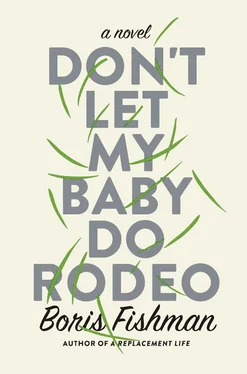“No.”
“What if I call you Sam?”
“Noooo,” Max whined.
Alex kept his eyes on the windshield — she could try if she wanted. He savored his success with Max and did not want to be sullied by Maya’s failure. Maya fidgeted in the front seat. Her seat belt was suffocating her. She hated seat belts. She had been told at the hospital that in some countries motorists could purchase T-shirts emblazoned with a diagonal black stripe, to fool traffic policemen.
“What about Tim?” she said to her son.
“What is wrong with you?” Alex hissed.
Maya saw the beginning of tears on Max’s face. Because she had gone too far? Because Alex had raised his voice? They did not allow themselves to argue in front of Max. Alex’s eyes bored into the side of her face. “Watch the road,” she said in defeat. She asked him to pull over, knowing he didn’t like to — he didn’t wish to be in the breakdown lane unless he was really in breakdown — and climbed into the backseat next to Max, where she covered him with kisses. She cradled her son against the flat board of her chest and rocked him until he quieted down. Alex chauffeured silently the rest of the way.
When they returned to the house, Alex shut himself in the garage, as if he had been the one whom Maya had unfairly attacked. Maya, no nerve to take on a large meal, diced fresh vegetables for a salad. She was so absentminded that after she had chopped cucumbers, carrots, and a handful of roasted red peppers, she started hacking the knife through a mound of corn kernels. She let the knife fall to the board, drew a wrist across her forehead, and closed her eyes. She was interrupted by the porch door sliding open to reveal Eugene and Raisa hefted with grocery bags. “So, are the inner demons cured?” Eugene yelled. As if Alex had been waiting for the appearance of referees, the garage door burst open.
“Who’s got the inner demons?” he battered his wife. “Tim, she calls him.” He lowered his voice. “Why don’t you tell him his mother’s name, too? Sit him down and tell him the whole story.” He raised it again: “Meanwhile, that genius wants him to change his name and purchase an animal.” He held up a palm, fastidious and insulted; the fingers were tight with each other as if he was swearing on a sacred book. “No more quackery. I went along with this, but: enough.”
“I told you,” Eugene said happily.
“But Bender was your idea,” Maya said to her husband. “I wanted to take him to an American psychologist.”
“Was taking him to a psychologist my idea?” Alex said. “Psychologists are for mentally ill people.” Alex mimed a paraplegic. “Max is fine. I’ve talked with him. We understood each other. He’s perfectly normal.”
“Except for this one thing,” Maya said. “Which puts his life in danger.”
Alex cast Maya a contemptuous look. “You keep taking him to Bender and the like, they’ll find what you want and ten other things. Anything to keep the checks coming.”
“Someone’s always cheating you, Alex,” Maya said.
“For me, this is the end of the conversation.” Alex’s look furiously offered to repay further silence with silence. Eugene and Raisa swiveled their heads between them.
“Bender made several points in his book—” Maya began.
“The end!” Alex bellowed. He did not allow himself to raise his voice at his wife often.
Maya gave up and returned to the vegetables. Alex returned to the garage. Eugene unloaded the grocery bags around Maya, whistling an old tune. Raisa admonished him — it was bad luck to whistle inside.
Adopting a child, it turned out, was nearly as difficult as conceiving one. Mishkin, the new adoption supervisor, had laughed when the aspiring parents had gently inquired whether a Jewish child might be available. “A Jewish child?” he’d said. “A unicorn comes online more often than Jewish.” Even though the Rubins were participating in the last American pastime that allowed for open discrimination — they could ask for Jewish; the birth parents could ask for non-Jewish — realistically, their choice was between a Catholic, familiarly dark-haired but unfamiliarly Hispanic, and a Protestant, familiarly Caucasian but unfamiliarly blond. Asian Americans seemed to fall into the same category as Jews, though there were plenty of Asian children from Asia. There were African American children, of course, and these were — no way around it — less expensive, but the Rubins could perform only one radical departure from the familiar at a time.
Periodically Mishkin called to haggle: raise the acceptable age; expand the list of eligible birth countries; change the adoption from “closed” to “open”—no one did “closed” anymore. Several times Maya came close to buckling, but then Alex spoke to the supervisor in such a way that Mishkin never needled again. Maya was at once grateful and angry. Grateful to be looked after, angry that Alex had disciplined the man who, Maya felt, held the keys to the kingdom. And, in fact, Mishkin, who was on speakerphone, had signed off with: “You want the impossible. You want an American newborn in five minutes or less, without a relationship with the birth parents.”
“What, Mr. Mishkin, you work on commission?” Alex had replied. The line went dead.
Three generations before, Mishkin’s own ancestors had made the passage from Old World to new, and the soft spot — not to say unreasonable patience — that Mishkin confessed to feeling for the Rubins he explained on account of this heritage. In fact, the Rubins had stirred in him such a fury of curiosity and nostalgia that he decided to embark on a self-discovery tour in the archives of both the Mishkin family and Ellis Island. It was because Mishkin had overheard the Rubins whispering in what he thought was Russian at IAS that he had inquired, and volunteered to take over the file from Slab-Face.
This was a strange custom of American Jews: They assaulted recent émigrés from the former Pale with biographical thumbnails meant to produce. . what exactly? Maya would listen politely before finally, timidly, asking if the Rubins’ profile had had any bites. It had not, Mishkin conceded, which filled Maya with a brutal sense of rejection, as if not only genetics but even other humanity had deemed the Rubins unworthy of parenthood.
“Ask him if he knows Mishkin is the name of Dostoevsky’s idiot,” Eugene remarked after yet another Mishkin monologue about patrimony, casting a meaningful look at his wife, the former teacher of literature. Eugene, like his son, considered Mishkin tainted by the whole idea of adoption and refused to deal with him, leaving it to Maya, though the adoption supervisor’s cavalier style and self-absorbed prologues enabled Eugene to pretend that he disliked Mishkin on Maya’s behalf.
“Dostoevsky’s idiot is an idealistic figure,” Raisa reminded her husband.
And then, with no ceremony—“it only takes one,” Mishkin had warned them, “like love”—the wait was suddenly over. A young couple in Montana had chosen them to receive their newborn. Maya felt rewarded, or placated. Like an addict slipping back under the spell, she had cooked prodigious amounts of food during their months of waiting for news, pressing it on the senior Rubins, Moira and the others at the hospital, the trashman, the electric-meter man, the lawn guys, the lifeguard at the Sylvan Gate pool. Periodically, Alex would wander into the kitchen, purse his lips at the bedlam, extract the cognac from the cupboard, and tiptoe out carefully. “The maternal instinct is kicking in,” Eugene observed sourly. She had pressed her kitchen, the only blandishment in her arsenal, so fervidly on the universe that God had broken down, relented, agreed to send her a child if only she’d quit. However: Montana?
Читать дальше












